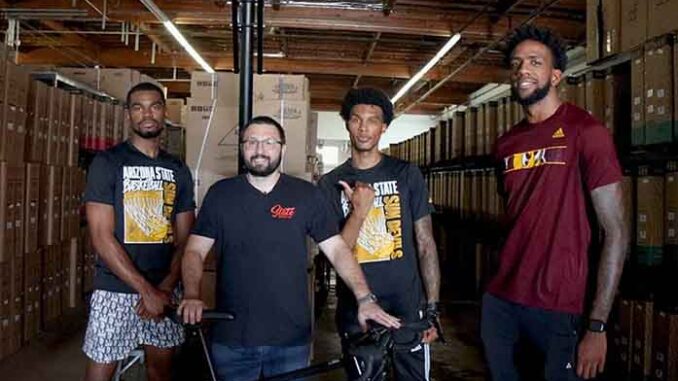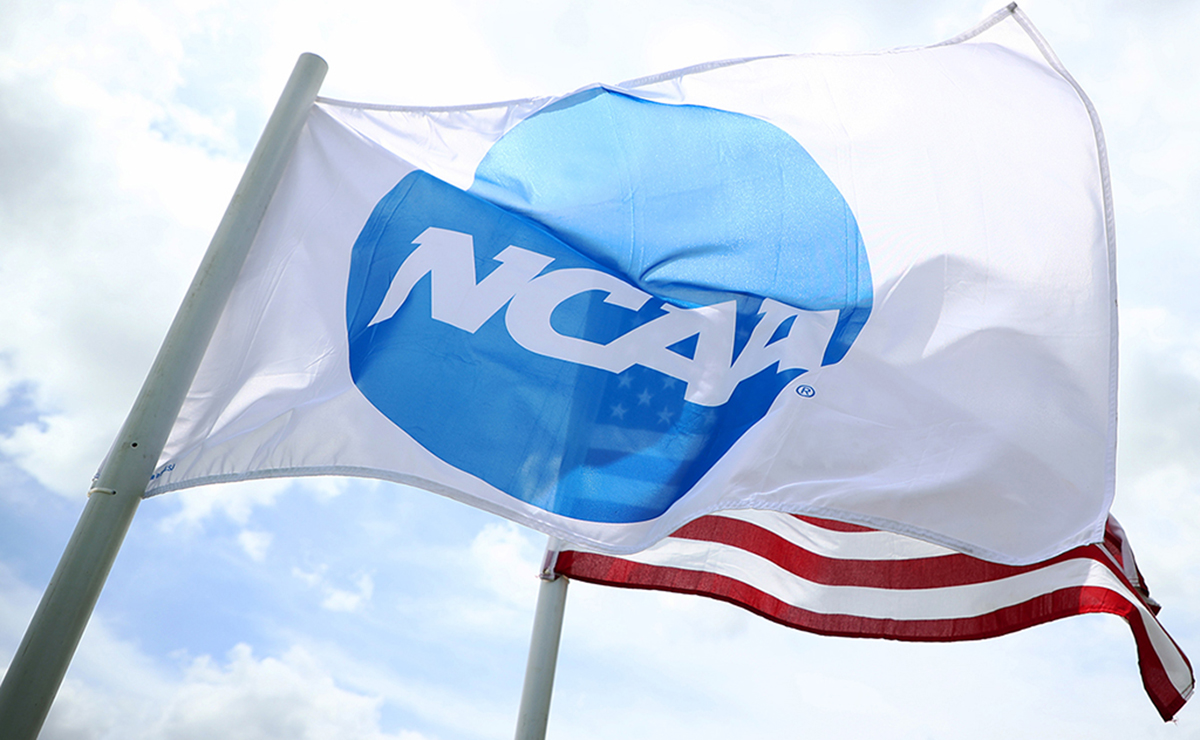
PHOENIX – Arizona State’s 600-acre campus in Tempe is home to more than 50,000 students, which creates traffic congestion that can be overwhelming. As a result, on-campus parking is at a premium.
To expedite his travels, incoming men’s basketball guard Desmond Cambridge weighed purchasing a bike or scooter before the fall semester. About the same time – to his surprise – State Bicycle Co. reached out about collaborating with him and his teammates, his brother Devan Cambridge and Warren Washington. The genuine interest from both sides sparked a name, image and likeness (NIL) partnership.
“It’s always been fun to watch them perform, and they entertain us, so I think they should be compensated, especially if they can help your business as well,” said Reza Farsi, COO and co-founder of State Bicycle.
The Cambridge brothers and Washington visited the company’s warehouse over the summer to view and choose bikes from its collection. These 6-foot-plus transfer players relish the thought of easy commuting and feeling like kids again.
“It’s probably been eight to 10 years since I last rode a bike, and I was just thinking of all the times doing it as a kid with my family, and it really brought back memories for sure,” said Washington, who turned his eight-minute walk to Desert Financial Arena to a two-minute commute with his custom black and yellow “Wu-Tang Clan” bike.
“You get so used to driving a car, and it’s muscle memory, but when you ride a bike, it’s just soothing, and it’s peaceful.”
A win-win for State Bicycle and athletes
Founded in 2009, State Bicycle sells fixed-gear bicycles, bike parts, helmets, clothing and accessories. The company has amassed over 444,000 followers on Facebook, 8,000 on Twitter and 134,000 on Instagram.
The transfer trio is among more than 30 Arizona State athletes to partner with the bicycle brand, which seeks to collaborate with players who have a strong social media presence. Each player researched deals that aligned with their values, like originality, peacefulness, aesthetics, meaningful connections and upstanding character. State Bicycle checked all the boxes, and a meeting with Farsi sealed the deal.
“We saw a lot of opportunity with our product, coinciding and being marketed towards college kids,” Farsi said. “We have a ride shop in Tempe, right next to ASU campus, so we figured with NIL being allowed and being able to use student-athletes to help market your products, it was a good opportunity for us to use someone reputable that the students recognize, as well as help the student-athletes out.”
Devan, who attended Gilbert’s Hillcrest Prep, has a $94,000 NIL valuation, according to On3, with more than 127,000 Instagram followers and 5,000 followers on Twitter. Desmond has a $60,000 NIL valuation with over 4,000 Instagram followers and 1,000 followers on Twitter, while Washington has more than 5,000 Instagram followers and 1,000 followers on Twitter.
Each player’s social media requirements vary by deal, but athletes usually post a feed or story post on Instagram and Twitter and add a personalized coupon code for a $50 discount. If consumers use the code to purchase any bike on State Bicycle’s website, players receive a percentage.
“We are the ones that make things cool, so if we do it, everybody else will catch on, and that’s just how you gotta look at it because I don’t care,” Desmond said. “I’m cruising. I’m ‘Fast & Furious’ down the sidewalk, while you’re walking in the hot sun.”
Farsi was hesitant to enter the NIL space because prominent athletes, such as quarterbacks Quinn Ewers at Texas and Bryce Young at Alabama, signed deals in the range of $1 million. However, the number of athletes interested in doing business with Farsi and his company surprised him.
“Where I don’t think it necessarily makes sense to, as you see in some of these other universities, (give) students millions of dollars to promote a certain product,” Farsi said. “But, if you can kind of test the waters by getting a group of student-athletes, who are willing to take a fair market compensation and compensate them, it definitely doesn’t hurt to test it out.”
More money, more problems?
Former LSU quarterback Myles Brennan retired from football in August after landing NIL deals with brands like Raising Cane’s, Smoothie King, GameCoin and Smalls Sliders. Breenan, who had a $327,000 NIL valuation before retiring, according to On3, kept the undisclosed money he made despite never playing a snap, as NIL agreements can be binding based on an athlete’s NIL contract. Farsi took notice of this situation.
“We have thus far done fairly small deals, where it wouldn’t hurt us too bad if someone did leave the team, and we continue to honor the contract as opposed to some of the other scenarios,” Farsi said.
NIL rules prohibit performance incentives or benchmarks in deals. Arizona State’s NIL policy states if a business compensates an athlete for performance, the school can change an athlete’s scholarship, and the NCAA can issue further punishment. Brennan’s situation may cause businesses to be hesitant to commit to long-term contracts.
“(If) that happened in pro sports, I would think any normal business that wasn’t associated with college athletes would try to cancel and void those contracts or even clawback and get back some of that money,” sports attorney Dan Lust said. “But I’m not sure we’re ready, as a society, to take that money away from a teenager or someone in their young 20s.”
Another issue is the lack of uniformity of NIL rules across the country, which has caused fear that schools are using NIL payments as recruiting inducements for high school recruits or transfers. For example, Arizona’s law requires colleges and universities to allow for NIL compensation, while Texas permits NIL but prohibits athletes from endorsing certain products and requires schools to create a financial literacy workshop for its athletes. With the NCAA hesitant to add or enforce restrictions, Lust believes there needs to be a federal law.
“The next step is really the federal bill,” Lust said. “Not everybody wants there to be some type of regulation in order. Some people like capitalism in this free economy. People can get creative this way and that way (in) different ways to pay athletes. But I just think the way that order is going to be instituted in a level playing field is by a federal law, which all states and all schools in those states would have to follow.”
Although athletic directors and coaches fear schools are exploiting NIL, Washington enjoys the freedom it has brought for athletes.
“It’s fine because I feel like it’s been going on forever,” Washington said. “I just feel like it was behind the scenes (and) under the table. It’s benefiting all colleges at this point because I feel like only the universities who had a lot of money were able to benefit. The way they’re doing (it) right now is perfect, and they should keep it the way it is.”
Although ASU players are landing deals, they still have the desire to perform.
“It’s really like another job,” Devan said. “You have to be able to separate the two. My end goal is making it to the NBA, going professional, so if I’m not working (and) worrying about this temporary money or deals, it’s not going to get me to the main goal because I’d be out of school, and NIL is not a thing anymore.”
Devan, Desmond and Washington have at least two NIL deals and are eyeing more as the season-opener approaches on Nov. 7 against Tarleton State. Still, this bicycle deal is special because they can explore their new environment with ease.
“I’m not going to lie,” Desmond said, “it’s been at least five or six years since I touched a bike, but when I got it, it took me about five, seven minutes to get my groove back. I was (struggling) a little bit, but after that, you never really forget.”

